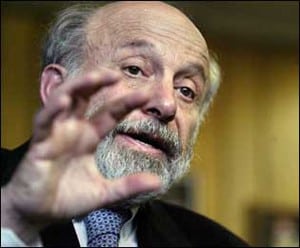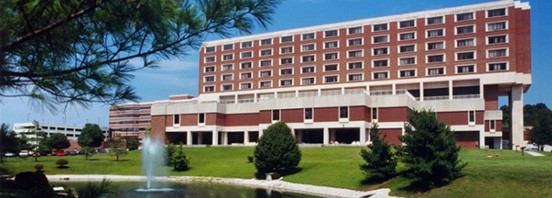“Local doctor pioneers ovary transplants”
ST. LOUIS POST-DISPATCH, February 12, 2007
by Tina Hesman Saey

When Dr. Sherman Silber made history in 2004 by transplanting ovarian tissue from a twin into her identical sister, he said it was a unique case that he wouldn’t repeat.
He changed his mind. Six sets of twins are glad he did.
Now, the St. Louis surgeon has become the first person to transplant a whole ovary — last month in twins, and last week, in non-twin sisters.
His colleagues applaud the achievement as a technical tour de force and praise Silber’s pioneering spirit.
His work is exciting because it’s a first step toward preserving fertility for cancer patients.
Before Silber, no one had shown that a woman’s ovary could be replaced successfully. If other doctors can replicate Silber’s success, a woman facing chemotherapy and radiation could have her own ovary frozen and returned to her later.
Silber’s transplants have worked well because the women involved didn’t require immune-suppressing drugs to keep them from rejecting the implanted ovaries.
Most sisters who are not identical twins would require those drugs, and even Silber’s supporters question whether the risk of those transplants outweighs the benefits.
Benefits of a whole ovary transplant include restoring fertility and natural hormone production, which helps prevent osteoporosis, heart disease and contributes to a woman’s general health. Immune-suppressing drugs can have serious side effects, and there are other ways to treat infertility and replace hormones.
Silber’s latest patient says the transplants are “opening a door” for young women locked in early menopause.
Three years ago, Joy Lagos, 30, was diagnosed with non-Hodgkins lymphoma. Her older sister Maeapple Chaney, 31, was a perfect tissue match.
Chaney gave her younger sister her bone marrow. The donation worked. Lagos was cured of her cancer, but the treatment shut down her ovaries and plunged the young woman into menopause.
“When you lose the function of your ovaries, you lose more than your fertility,” Lagos said.
She developed osteoporosis. Her sex drive waned.
“I didn’t feel like a woman,” she said.
TV report opens door
Chaney was willing to donate eggs so Lagos and her new husband, Rodrigo Lagos, could have a baby through in vitro fertilization. (The couple got married last September.) But Lagos wanted to feel like a young woman again. Her sister was willing to do anything she could to help. So Joy Lagos began looking for someone who would transplant her sister’s ovary into her.
Rodrigo Lagos was flipping through television channels one day. A teaser featuring Silber caught his eye. He recorded the “medical miracle” program featuring Silber’s first ovarian tissue transplant.
He couldn’t quite believe what he saw, so he searched the Internet. The first hit was Silber’s clinic at St. Luke’s Hospital. The second was a New England Journal of Medicine article describing the first transplant.
The Lagoses knew then that Silber was exactly the person they were looking for.
So Lagos and Chaney headed from their homes in California to the Infertility Center of St. Louis at St. Luke’s, which Silber directs.
Last week, Silber removed one of Chaney’s ovaries and gave it to Lagos. Such surgery is incredibly difficult because the artery that feeds blood to the ovary is no bigger around than a thread. Other gynecological surgeons described Silber as a “brilliant” and “extremely skilled” microsurgeon.
“Not everyone is going to play golf like Tiger Woods. It’s the same thing,” said Dr. Richard Gimpelson, a colleague of Silber’s at St. Luke’s and the past president of the AAGL, an association of gynecological surgeons.
Even so, reattaching the blood supply to the ovary is the most difficult procedure Silber has ever done, he said.
He chose to do the rigorous operation because he was disappointed in the longevity of the previous transplant technique he used in twins. The original procedure placed strips of ovarian tissue from the fertile twin into her prematurely menopausal sister.
Two of the recipients have had babies. Stephanie Yarber, Silber’s first transplant patient, now has two children thanks to the surgery. She had previously tried egg donation without success.
All of the women who have had the transplants are menstruating and ovulating normally, Silber said. But their ovaries are running out of steam faster than he had hoped. The women may get only two to five years of ovarian function using the strips of tissue, he said.
He hopes that a whole ovary with its own blood supply will last decades.
Silber’s success is exciting for people who hope to help cancer patients preserve their fertility, said Dr. Pasquale Patrizio, director of the Yale Fertility Center at Yale University.
Patrizio and others are working on ways to freeze whole ovaries. Right now, women who face infertility because of cancer treatments can have strips of their ovarian tissue frozen and replaced once they are in remission. But no one yet has successfully frozen a whole ovary and transplanted it.
Some reservations
Even Silber’s supporters are ambivalent about transplants that would require immune-suppressing drugs because of possible health effects for the mothers and their babies.
Silber said he’s pretty sure that low doses of the drugs wouldn’t harm a developing fetus. About 2,000 women who are on immune-suppressing drugs because of kidney transplants have had healthy babies, he said.
Lagos won’t need to take immune-suppressing drugs because the bone marrow transplant and the close match to Chaney makes her able to tolerate her sister’s tissue.
Legal, religious, social and ethical issues that don’t apply to other organs may surround ovary transplants, Gimpelson said.
“These other organs are donated to save someone’s life. The ovaries are to make someone’s life complete. It’s a little bit different,” he said.
Silber’s critics don’t give him enough credit, his colleagues say.
“I look at him as a pioneer. He’s willing to push the envelope, but he’s also really helping these patients. It’s not like he’s out there looking for some experimental case,” said Dr. David Battaglia, director of the IVF laboratory at Oregon Health Sciences University. “We’re getting an idea of what is possible for a whole population of patients. We need people like Dr. Silber to show us the way.”
See also:
